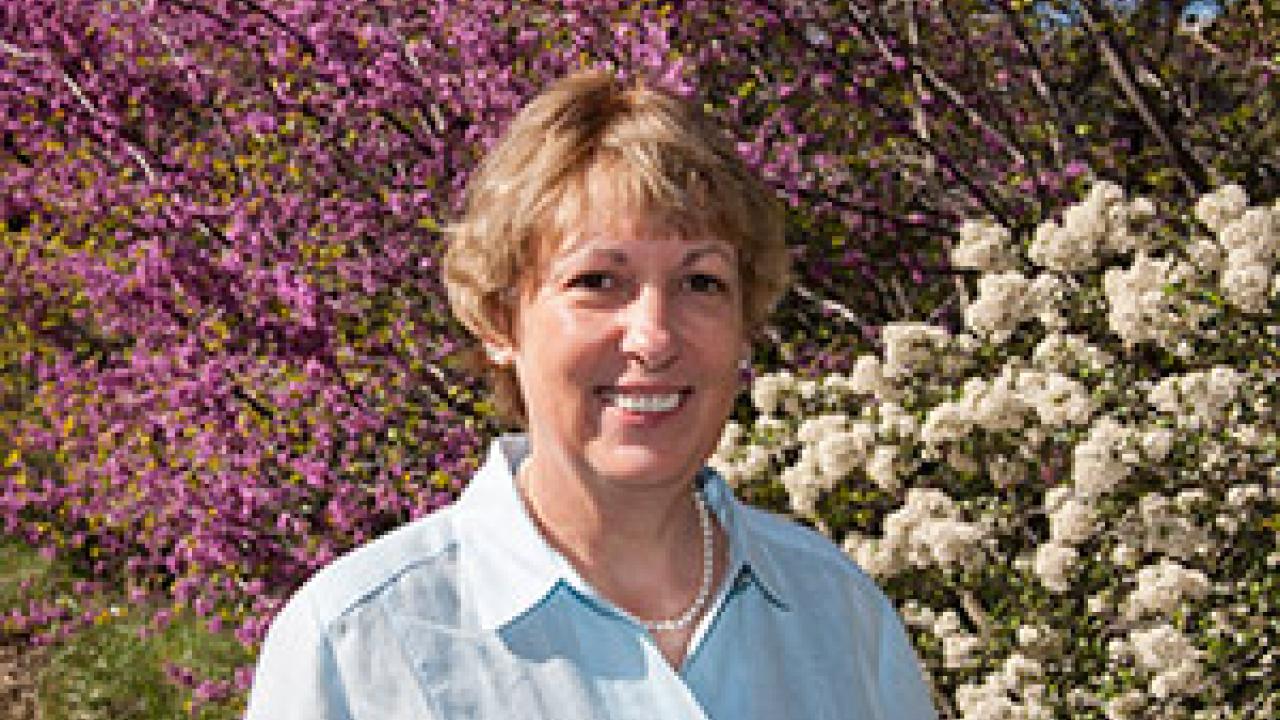
August 13, 2015
A Message from Dean Helene Dillard: Finding opportunities for research in California wildfires
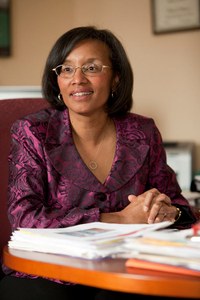 It’s summertime in California and that means two things are certain. It will be hot, and fires will scorch our wildlands. I was reminded of this as I was preparing to leave campus a few weeks ago when I noticed the sky was filling with a faint orange glow. In the mountains west of Davis, the Wragg Fire was beginning to take off and was sending huge plumes of smoke into the valley.
It’s summertime in California and that means two things are certain. It will be hot, and fires will scorch our wildlands. I was reminded of this as I was preparing to leave campus a few weeks ago when I noticed the sky was filling with a faint orange glow. In the mountains west of Davis, the Wragg Fire was beginning to take off and was sending huge plumes of smoke into the valley.
We learned later that UC Davis’ Stebbins Cold Canyon Reserve near Lake Berryessa was right in the path of the fire, which burned more than 8,000 acres. Almost all of the 576-acre reserve, which is used by our faculty and students, falls within the burn perimeter. The reserve is now closed to the public until damage can be assessed and restoration work carried out.
Reserve director Jeffrey Clary noted that in the aftermath of the fire there will be many science stories to tell: research opportunities stemming from the burn, potential restoration initiatives that can involve the community, a citizen science project based at the site that will need to be rebuilt. “We are happy to work with all of you to make sure we remain engaged with campus and the community during this period,” he said.
Wildfires can also exact a tragic human toll when they injure people, claim lives, and destroy homes. According to Cal Fire, at one point the Wragg Fire threatened 136 structures, including the homes of some CA&ES staff and faculty. Although a couple of outbuildings were destroyed, only one home was damaged and none was destroyed in this fire. People fleeing other wildfires in the state haven’t been as fortunate. The huge Rocky Fire in the Coast Range destroyed 43 homes and 53 outbuildings.
In recent decades more and more homes have been built in remote areas, increasing the human risks and costs associated with wildland fire. Fighting the disastrous 2013 Rim fire near Yosemite cost more than $127 million. But the real costs of a wildland fire are always much greater, typically including not just suppression but damaged structures, private timber stand losses, revegetation and slope stabilization, utility repairs, road and sign damage, and business interruptions.
While wildfires are a natural part of California’s history, their frequency, size, and duration have increasingly been influenced by the presence of humans and changes in our climate. Environmental science and policy professor Mark Schwartz, who is also director of the John Muir Institute of the Environment, has studied the effect of climate change on wildfires, as well as where and when plant communities are predicted to exhibit stress as a consequence of unusual climatic conditions (including wildfire).
He and colleagues recently published an article in the journal, Ecosphere, reporting that wildfires in the Sierra Nevada are increasingly burning high-elevation forests. Historically, Sierra Nevada forest fires rarely burned above the 8,000-foot elevation. But that’s changed in recent decades, with more fires burning at higher elevations. The phenomenon is likely being driven by climate change, forest-management practices, and other factors.
“The increase of higher-elevation forest fires is yet another harbinger of climate change,” Schwartz said in a UC Davis news release about the study. “With California currently in the midst of a four-year drought, low snowpack in the mountains and related forest stress are further increasing the chances of large, destructive fires that move high into the Sierra.”
The study may influence how forest managers respond in restoring a forest after a fire. Wildfire is a fact of life in California, and research like this helps provide a foundation for the development of sound policies for natural resources management. Drought and climate change will keep wildfire and its consequences on our radar for the foreseeable future.
Helene R. Dillard,
Dean
College of Agricultural and Environmental Sciences
hrdillard@ucdavis.edu
Who
Mary Delany and Kirk Klasing named fellows of the Poultry Science Association
Department of Animal Science professors Mary Delany and Kirk Klasing are among four new fellows of the Poultry Science Association (PSA).
They were honored, along with other award winners, at the association’s 104th annual meeting in July in Louisville, Kentucky. "PSA is honored to recognize our distinguished 2015 award winners," PSA president Todd Applegate said. "To our award winners, we salute you for your dedication and commitment to poultry science and the broader poultry community.”
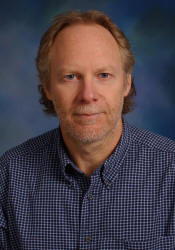
Kirk Klasing - Delany, who holds the John and Joan Fiddyment Endowed Chair in Agriculture and also serves as CA&ES executive associate dean, is a professor of developmental genetics. Her laboratory research focuses on avian telomere biology, with chicken being the primary organism under study. Professor Klasing specializes in the impact of nutrition on immunochemistry and disease resistance; immunologic basis of stress; and nutrition and metabolic adaptation of carnivorous, granivorous, and nectivorous birds.
PSA is a professional organization with 1,700 educators, scientists, extension specialists, industry researchers, administrators, producers, and college students who are committed to advancing the poultry industry. PSA Fellow is the highest recognition the organization bestows on its members. An individual is named a PSA Fellow for professional distinction and contributions to the field of poultry science. The other two fellows named this year are from the University of Arkansas and West Virginia University.
Mary Delany
Department of Animal Science
530-754-9343
medelany@ucdavis.edu
Kirk Klasing
Department of Animal Science
530-752-1901
kcklasing@ucdavis.edu
Ken Giles awarded gold medal from American Society of Agricultural and Biological Engineers
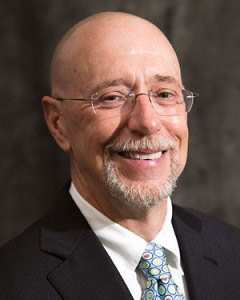
Ken Giles - Professor Ken Giles is the 2015 recipient of the Cyrus Hall McCormick–Jerome Increase Case Gold Medal. The award is given by the American Society of Agricultural and Biological Engineers and is named after the inventor of the self-rake reaper and the developer of the “reliable” threshing machine.
The McCormick–Case gold medal recognizes exceptional and meritorious achievement in agriculture that has resulted in new concepts, products, processes, or methods that advanced the development of agriculture. An award presentation was held in July at the society's international meeting in New Orleans.
Professor Giles specializes in agricultural chemical application. His research focuses on spray applications — including pesticide spraying and industrial spray coatings — along with the reduction of spray drift and environmental contamination. His major accomplishments have been in the development of new technology for mobile spraying systems.
Giles and his team are one of very few research entities to have received Federal Aviation Administration clearance to operate an unmanned, remote-controlled aircraft for such purposes. Since November 2012, he and UC Davis development engineer Ryan Billing have supervised field tests of a motorcycle-sized, remote-controlled helicopter at UC Davis’ Oakville Station, a research vineyard in Napa Valley. Watch a video.
D. Ken Giles
Department of Biological and Agricultural Engineering
530-752-0687
dkgiles@ucdavis.edu
Amanda Guyer selected to serve on NIH scientific review panel

Amanda Guyer - Department of Human Ecology Associate Professor Amanda E. Guyer has been selected to serve as a member of the Psychosocial Development, Risk and Prevention Study Section at the Center for Scientific Review in the National Institutes of Health. Her term began July 1 and runs through June 30, 2021.
- Members are selected on the basis of demonstrated competence and achievement in their scientific discipline, as evidenced by the quality of research accomplishments, publications in scientific journals, and other significant scientific activities, achievements, and honors. Membership on a study section provides a unique opportunity to contribute to the national biomedical research effort. Study sections review grant applications submitted to the NIH, make recommendations on these applications to the appropriate NIH national advisory council or board, and survey the status of research in their fields.
Guyer is affiliated with the UC Davis Center for Mind and Brain. Her human experiences and affective development lab relies on cognitive neuroscience methods to examine typical and atypical development of social and affective brain systems in adolescents.
Amanda Guyer
Department of Human Ecology
530-297-4445
aeguyer@ucdavis.edu
Brian Johnson and Brett Milligan among new Hellman fellows
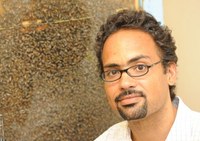
Brian Johnson - Two CA&ES faculty members are among 12 new Hellman fellows announced in June: Brian Johnson, assistant professor in the Department of Entomology and Nematology, and Brett Milligan, assistant professor in the Department of Human Ecology’s landscape architecture program.
- The Hellman Family Foundation established the UC Davis Hellman Fellows Program in 2008 to support and encourage the research of promising assistant professors who exhibit potential to achieve great scholarly distinction. Individual awards for the 2015 fellows range from $12,000 to $44,000 to support research and other creative scholarly activities and to assist faculty members in making progress toward tenure.
The selection process gives preference to faculty members with outstanding research proposals but who may have only modest means to support such research and have never received other young investigator awards. Johnson’s fellowship subject is the genetic mechanisms underlying the evolution of novelty. Milligan’s fellowship subject is DredgeFest California: Bay-Delta Earthworks.
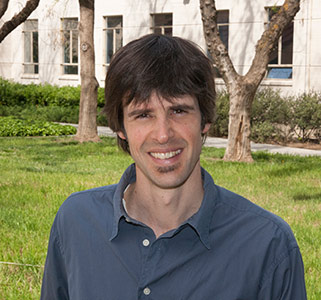
Brett Milligan - “Each year, the originality and potential impact of the work being done by our UC Davis Hellman Fellows is both thrilling and humbling,” said Academic Affairs Vice Provost Maureen Stanton in announcing the awards. “We are in the capable hands of an outstanding new generation of faculty.”
- The Hellman Fellows Program is active at the 10 campuses of the University of California and four private institutions.
Brett Milligan
Department of Human Ecology
505-980-1761
bmilligan@ucdavis.edu
Brian Johnson
Department of Entomology and Nematology
858-397-3579
brnjohnson@ucdavis.edu
R. Paul Singh named World Agriculture Prize laureate
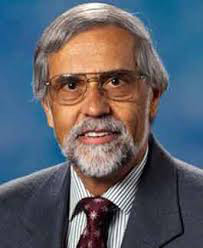
R. Paul Singh - Distinguished professor emeritus R. Paul Singh, who held dual appointments in the departments of Biological and Agricultural Engineering and of Food Science and Technology, has been named as the 2015 Global Confederation for Higher Education Association for Agriculture and Life Sciences World Agriculture Prize laureate.
- The award was announced at the annual GCHERA conference, held in Lebanon earlier this summer. Formal presentation of the award will take place September 20 during a ceremony at Nanjing Agricultural University, Jiangsu Province, China.
Singh became recognized for a body of research in areas such as energy conservation, freezing preservation, postharvest technology, and mass transfer in food processing. His research on airflow in complex systems helped in the design of innovative systems for the rapid cooling of strawberries, and his studies on food freezing led to the development of computer software that is used to improve the energy efficiency of industrial freezers. His research group also created food-processing equipment for a manned mission to Mars. In recent years, his research focused on the physical mechanisms responsible for the digestion of foods in the human stomach.
“I’m deeply humbled and honored, upon receiving news of this award,” Singh said. “I’m proud of my students, postdoctoral fellows, and visiting scientists for their numerous contributions to our research program. I’m also indebted to my UC Davis colleagues for their consistent support, which has allowed me to pursue my research and teaching activities in food engineering.”
R. Paul Singh
Department of Biological and Agricultural Engineering
530-752-4710
rsingh@ucdavis.edu
Ken Tate is 2015 recipient of James H. Meyer Distinguished Achievement Award
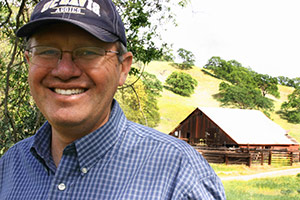
Ken Tate - UC Cooperative Extension specialist Kenneth Tate is the 2015 recipient of the James H. Meyer Distinguished Achievement Award. The award recognizes a distinguished career of achievement by an Academic Federation member. A secondary but important consideration is voluntary service to the campus, UC community, or state, regional, or national bodies.
Tate has compiled an impressive record of collaborative and solution-oriented research addressing agricultural and environmental issues across California’s 57 million acres of rangeland. He provides science and education leadership to California’s diverse rangeland stakeholders and the campus community and has been repeatedly recognized for his work on surface water quality on rangelands. He has given more than 400 extension presentations, published more than 100 journal articles, served as principal investigator on 37 research and extension grants ($6.3 million), and as co-principal investigator on another 43 research and extension grants ($5.7 million).
Tate works with private landowners, agency land managers, and regulatory agency staff to understand the fate and transport of surface water pollutants. Early in his career he helped identify management practices to reduce drinking water contamination risks by livestock-borne Cryptosporidium parvum and other pathogens, which enabled ranching families to continue sustainable grazing practices on watersheds east of San Francisco. He has also worked with these groups to identify and implement realistic management practices to reduce pollutants. Tate is known for his ability to build consensus among diverse audiences on controversial topics related to range livestock production. In 2011, he developed the biennial UC Rustici Rangeland Science Symposium that features scientists, policymakers, and ranchers working on key rangeland issues.
“Dr. Tate has advanced a remarkable and productive research and extension career in range management and environmental stewardship,” said Department of Plant Sciences chair Chris van Kessel in nominating Tate for the award. “His program has been exemplary in bringing together diverse research and management collaborations to evaluate scientific information relevant to targeted issues, contribute new scientific knowledge, and extend tools and knowledge to serve the needs of society."
Kenneth Tate
Department of Plant Sciences
530-754-8988
kwtate@ucdavis.edu
What
New leadership and vision at Center for Vector-borne Diseases
The Center for Vector-borne Diseases recently announced new leadership and a new vision. The center is a multidisciplinary unit that includes partners in the School of Veterinary Medicine, the School of Medicine, the College of Agricultural and Environmental Sciences, and the College of Biological Sciences.
Interim co-directors Professor Janet Foley, School of Veterinary Medicine, and Professor Shirley Luckhart, School of Medicine, are coordinating activities of faculty, staff, and students to enhance scientific and educational advancement in vector biology and vector-borne diseases. The center seeks to accelerate the implementation of public health policies to transform the lives of people and animals in California and around the world. Foley and Luckhart are promoting multidisciplinary and collaborative exchange programs across campus in training and research to understand, prevent, and manage vector-borne diseases of plants, animals, and humans.
Read the center’s July Update to learn more or visit the center’s website.
Janet Foley
School of Veterinary Medicine
530-754-9740
jefoley@ucdavis.edu
Shirley Luckhart
School of Medicine
530-754-6963
sluckhart@ucdavis.edu
Arboretum and Public Garden events
For more information, visit the arboretum website: http://arboretum.ucdavis.edu.
Folk Music Jam Session
Friday, August 14, 28, noon–1 p.m., Wyatt Deck
Folk musicians are invited to bring their acoustic instruments and play together informally over the lunch hour. All skill levels are welcome, and listeners are invited.
Succulent Surprises
Saturday, August 29, 10 a.m., Ruth Risdon Storer Garden
Succulents can take the heat, even in midsummer. See examples of succulents of all sizes in the Ruth Risdon Storer Garden and learn how to grow them in the home garden at this free event.
When
Applied Reproductive Strategies in Beef Cattle Symposium: August 17–18, 2015
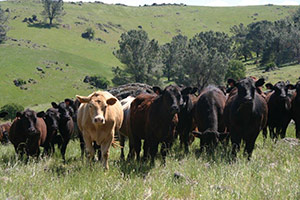 The 2015 Applied Reproductive Strategies in Beef Cattle Symposium takes place in the UC Davis Conference Center on August 17–18. The national event, being held in California for the first time, will be of interest to cattle producers, veterinarians, faculty, UC Cooperative Extension specialists and advisors, and students.
The 2015 Applied Reproductive Strategies in Beef Cattle Symposium takes place in the UC Davis Conference Center on August 17–18. The national event, being held in California for the first time, will be of interest to cattle producers, veterinarians, faculty, UC Cooperative Extension specialists and advisors, and students.
“Speakers from multiple states will outline approaches to improve the efficiency and success of beef cattle reproduction,” said Alison Van Eenennaam, a UC Cooperative Extension specialist in the Department of Animal Science.
Participants will explore key topics in beef cattle reproduction, including physiology, genetics, management, marketing, and strategies for coping with drought. Heifer development will also be addressed, along with the role maternal nutrition plays in fetal development.
Registration is $250; $100 for students. To register. More information is available at the conference website.
Alison Van Eenennaam
Department of Animal Science
530-752-7942
alvaneenennaam@ucdavis.edu
Training for UC Davis online events calendar: August 18, 2015
A training to learn more about the new UC Davis online events calendar will be held August 18 from 1 p.m. to 2 p.m. in 203 Mrak Hall. Anyone in the college is welcome to attend, but an RSVP to crcloud@ucdavis.edu is requested.
The calendar is designed to be the most complete listing of what’s happening at UC Davis — from seminars and conferences, to arts and athletic events, to fairs, expos, and exhibits. The calendar includes images and logos, map links (for venues), search and filter tools, and “Add to calendar” and “Forward to friends” buttons. Open an event and more options, such as email and text reminders, are available. Event planners can use it as registration tool. Every event includes sharing tools for social media. Users can subscribe to automatic feeds for all events that fit personal criteria.
The calendar is open to all UC Davis departments and units. Departments and units enter their own events, which are then routed to designated calendar administrators in the colleges, schools, and administrative units for approval and posting.
Visit the new online calendar. To learn more, read this article from Strategic Communications.
Carrie Cloud
CA&ES Dean’s Office
530-204-7500
crcloud@ucdavis.edu
Weed Science School: August 18–20, 2015
Weed Science School takes place August 18–20 at the Bowley Plant Sciences Teaching Center. This intensive course focuses on the mode and mechanism of herbicide activity in plants and the fate of herbicides in the environment.
The school is designed for those involved in consulting, research, development, or sales of agricultural chemicals in either the private or public sector and provides a rare opportunity for professionals to efficiently update their understanding of weed science and the action of herbicides in the plant and in the environment. Emphasis is on herbicides registered for use in California and important weeds within the state.
Registration is $775. Registration and agenda information.
Gale Pérez
UC Weed Research and Information Center
530-752-1748
gperez@ucdavis.edu
Neonicotinoids and their impact on pollinators: September 9, 2015
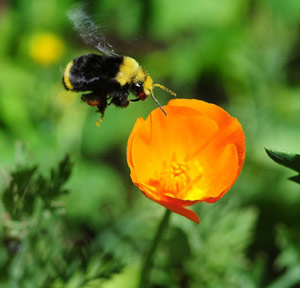 A September 9 conference at UC Davis will examine neonicotinoid insecticides and their impact on pollinators.
A September 9 conference at UC Davis will examine neonicotinoid insecticides and their impact on pollinators.
Neonicotinoids and their impact on pollinators: what is the science-based research? runs from 10 a.m. to 4 p.m. in the UC Davis Conference Center. The conference is presented by the Department of Entomology and Nematology, California Center for Urban Horticulture, and UC Agriculture and Natural Resources. Topics include an overview of neonicotinoids and pollinators; California pesticide regulations; current and past research; neonicotinoid risks associated with invasive species management; and trends in neonicotinoid usage in California agriculture. A stakeholder panel will address issues and concerns about neonicotinoids, followed by a question and answer session.
Conference cost is $50 and includes lunch. A social follows the program. The conference agenda is located at the CCUH website.
Kate Lincoln
California Center for Urban Horticulture
530-752-6642
kmlincoln@ucdavis.edu
California Salmon and Climate Variability Symposium: September 10, 2015
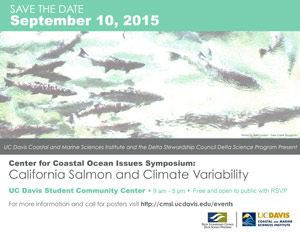 The California Salmon and Climate Variability Symposium will be held September 10 in the Student Community Center from 9 a.m. to 5 p.m. The symposium is convened by the UC Davis Coastal and Marine Sciences Institute’s Center for Coastal Ocean Issues and the Delta Stewardship Council, Delta Science Program.
The California Salmon and Climate Variability Symposium will be held September 10 in the Student Community Center from 9 a.m. to 5 p.m. The symposium is convened by the UC Davis Coastal and Marine Sciences Institute’s Center for Coastal Ocean Issues and the Delta Stewardship Council, Delta Science Program.
The goal of the symposium is to contribute to the ongoing discussions between the research and stakeholder communities and policymakers on the management of California’s Central Valley salmon resources. Topics include the feedbacks between climate and river flows on salmon populations, understanding the effects of biodiversity on population stability, and how hatcheries and fisheries affect salmon. The symposium builds on a previous symposium, Factors Influencing the Salmon Decline in California and the Pacific Northwest, and will highlight new scientific findings and management challenges.
Posters are welcome from academia, management, and industry, describing ongoing salmon research, new restoration, recovery, or management programs, and encouraging preliminary results. Symposium participants interested in presenting a poster should complete a Google form by August 24.
The UC Davis Coastal and Marine Sciences Institute established the Center for Coastal Ocean Issues to provide a forum for policymakers, managers, and scientists to address the challenges in sustainably managing marine and coastal natural resources.
The symposium is free and open to the public. However, registration is required. To learn more and register.
Shauna Oh
Coastal and Marine Sciences Institute
530-752-1272
sjoh@ucdavis.edu
International Conference on Fresh-cut Produce — Maintaining Quality and Safety: September 13–18, 2015
Registrations are being accepted for the third International Conference on Fresh-cut Produce — Maintaining Quality and Safety. The conference will be held on the UC Davis campus, September 13–16, with an optional two-day technical tour, September 17–18. Conference attendance is limited to 200 registrants.
The conference is hosted by the Postharvest Technology Center at UC Davis and is being organized by UC Cooperative Extension specialist Marita Cantwell under the aegis of the International Society for Horticultural Science. Internationally known experts in fresh-cut processing technologies and research will be giving presentations. General topics include quality and product development, temperature and handling logistics, preparation and processing, packaging and modified atmospheres, food safety and sanitation, and marketing and consumer acceptance. An industry–academia panel also is planned, focusing on future industry needs and emerging technologies in fresh-cut products.
Register and learn more. The conference will take the place of the annual fresh-cut workshop in 2015.
Penny Stockdale
UC Davis Postharvest Technology Center
530-752-7672
pastockdale@ucdavis.edu
UC Master Milling Certificate Course: October 1–4, 2015
The UC Davis Olive Center will hold a Master Milling Certificate Course at the Silverado Vineyard Sensory Theater in the Robert Mondavi Institute on October 1–4.
The four-day course will be led by Leandro Ravetti, a leading expert in olive oil processing, growing, and standards in Australia. Included in the course will be a field trip to three olive oil processors in Yolo County. Past attendees of the Master Milling Short Course have made immediate improvements in the quality and profitability of their oil processing operations.
The course has attracted attendees from throughout the world. Instructors include Ravetti, Olive Center director Dan Flynn, and Olive Center research director Selina Wang. Registration is $1,225. To learn more and register.
Dan Flynn
UC Davis Olive Center
530-752-5170
jdflynn@ucdavis.edu
CA&ES College Celebration: October 2, 2015
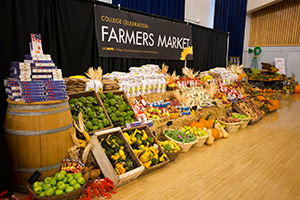 The 27th annual CA&ES College Celebration will be held on Friday, October 2, 2015 in the UC Davis ARC Pavilion. The event honors seven people who will receive an Award of Distinction, the highest recognition presented by the college. After the awards ceremony, guests will be served hors d’oeuvres, wine, beer, and other refreshments. The evening culminates with the dismantling of the farmers market welcome display, where attendees are invited to take home a bagful of fresh California produce and grains.
The 27th annual CA&ES College Celebration will be held on Friday, October 2, 2015 in the UC Davis ARC Pavilion. The event honors seven people who will receive an Award of Distinction, the highest recognition presented by the college. After the awards ceremony, guests will be served hors d’oeuvres, wine, beer, and other refreshments. The evening culminates with the dismantling of the farmers market welcome display, where attendees are invited to take home a bagful of fresh California produce and grains.
The 2015 CA&ES Award of Distinction honorees include:
Alumni — Jacqueline Beckley, Chuck Nichols, Tom Smith
Friends of the College — John Meyer, Jeff Smith
Outstanding staff — David Ginsburg
Outstanding faculty — Chris van Kessel
Online registration is open. Tickets are $20. Link to the College Celebration website to learn more about the event. Link here for a location map of the UC Davis ARC Pavilion. Parking is in the adjacent visitor parking lot #25.
Carrie Cloud
CA&ES Dean’s Office
530-204-7500
crcloud@ucdavis.edu
Water Policy for Food Security — a Global Conference: October 5–6, 2015
The World Food Center at UC Davis and the International Food Policy Research Institute (IFPRI) will host a conference October 5–6 on water policy and planning for food security. “Water Policy for Food Security — a Global Conference” will address key issues at the national level, using case studies and a breadth of experience to inform policy and investment options.
The conference will be held at the UC Davis Conference Center and will bring together policymakers, researchers, development investors, and industry leaders. The goal is to advance solutions to the global challenge of reconciling the growth of food with the demands of urban, industrial, and environmental needs for freshwater supplies — all against a backdrop of higher energy prices and climate change.
Registration is $50 for students, $250 for academics, and $350 for others. The registration fee includes continental breakfast and lunch each day and an evening reception on October 5. A limited number of grants for developing country participants will be available. For additional information and to register online.
Julie Kaye
UC Davis World Food Center
530-752-7172
jlkaye@ucdavis.edu
UC ANR Joint Strategic Initiative Conference: October 5–7, 2015
UC Agriculture and Natural Resources will hold its first Joint Strategic Initiative Conference on October 5–7 at the Sheraton Grand Hotel in Sacramento.
The five initiatives include endemic and invasive pests and diseases; healthy families and communities; sustainable food systems; sustainable natural ecosystems; and water quality, quantity and security. Advisors, specialists, AES faculty, program directors, and academic coordinators are encouraged to attend. In addition to highlighting the impacts of current initiatives and assessing future directions, there will be a number of opportunities for in-service training and workgroup and program team meetings.
Two poster sessions are planned. Submit a 250-word (maximum) abstract by August 27. To learn more and register.
Sherry Cooper
UC ANR Program Support
530-750-1256
slcooper@ucanr.edu
Saundra Wais
UC ANR Program Support
530-750-1260
sjwais@ucanr.edu
Produce Safety — a Science-based Framework Workshop: November 3–5, 2015
The UC Davis Postharvest Technology Center is offering a workshop, November 3–5, on developing a scientific framework for produce microbial safety systems and preventive controls. The course is designed primarily for entering and junior-level produce safety professionals and others with an interest in produce safety education.
Course content will provide participants with a basis for decision making on topics common to industry guidance standards, as well as federal regulatory compliance. The curriculum is a blend of fundamental, applied, and practical information. The course includes formal lectures, group assessments, and break-out groups. The curriculum includes the scientific basis for audit standards and preparing for using audits and targeted microbiological testing to improve performance.
The course will be held in the ballroom at the UC Davis Conference Center. Enrollment has been reduced to $750 and includes instruction, course material, a networking reception, and two lunches. For additional information and to enroll, visit the course website. Enrollment is requested by October 23, 2015.
Penny Stockdale
Postharvest Technology Center
530-752-7672
pastockdale@ucdavis.edu
Identifying and mitigating unintended consequences of restoration activities: November 5, 2015
An inaugural “Do No Harm” conference will focus on identifying, preventing, and mitigating the spread of pests, plant pathogens, and diseases through restoration. It will be held at the UC Riverside Palm Desert Center on November 5 from 9 a.m. to 5:30 p.m.
A primary objective of this conference is to identify the stumbling blocks to achieving ecologically and economically successful restoration of disturbed lands in California. The conference will bring together experts, practitioners, suppliers and policymakers to develop best management practices. Others who may want to attend include landowners, conservation organizations, agencies and jurisdictions managing open space or rights-of-way, nurseries, seed collectors and distributors, consultants, researchers, and other practitioners of restoration. The event is being sponsored by UC Riverside, UC Agriculture and Natural Resources, UC Davis, Dominican University of California, and the Center for Conservation Biology.
Registration is $45 ($25 for students). Continuing education units are available. The UC Riverside Palm Desert Center is located at 75080 Frank Sinatra Drive. To register and learn more.
Elise Gornish
Department of Plant Sciences
530-752-6314
egornish@ucdavis.edu
Travis Bean
UC Riverside Department of Botany and Plant Sciences
951-205-3974
travis.bean@ucr.edu
UC Soil and Water Short Course: November 17, 2015
The UC Vegetable Research and Information Center will sponsor a UC Soil and Water Short Course on November 17 at the Buehler Alumni Center.
This short course will focus on the practical aspects of soil fertility in an era of escalating fertilizer costs and increasing government regulation of on-farm nutrient management. The topics covered will include getting the maximum value from soil and water testing, comparing fertilizer sources, irrigation effects on soil nutrient management, and fertilizer management and environmental protection. Although the focus will be on nutrient management in annual cropping systems, much of the material presented will be relevant to perennial crops as well. Presentations will address fertility management issues for both conventional and organic production. The content will be geared toward commercial-scale production, and will assume attendees have a working knowledge of basic soil science.
Growers, consultants, government agency personnel, and others involved in soil fertility management will find this course valuable. Attendance would be useful for anyone preparing to take the California Certified Crop Advisor (CCA) exam. This course is approved for six hours of CCA credit (3.0 nutrient management, 3.0 soil and water management.) This course is not appropriate for home gardeners.
Early registration is $160 and will rise to $180 on October 30. The registration fee includes lunch, light refreshments, and study materials. To learn more and to register.
Gale Pérez
Department of Plant Sciences
530-752-1748
gperez@ucdavis.edu
* * * * * * * * * * * * * *
Visit CA&ES Currents online at http://www.caes.ucdavis.edu/news/publications/currents.
CA&ES Currents, the faculty/staff newsletter of the College of Agricultural and Environmental Sciences at the University of California, Davis, is published monthly. Send news items to editor, jdstumbos@ucdavis.edu.
Editor: John Stumbos
Writing: Helene Dillard, John Stumbos
Editorial review: Robin DeRieux, Julie Fritz-Rubert, Thomas Kaiser, Christine Schmidt
To be added to or deleted from this electronic newsletter list, please send an e-mail to: caeseditor@agdean.ucdavis.edu.
The University of California does not discriminate in any of its policies, procedures, or practices.
The university is an affirmative action/equal opportunity employer.